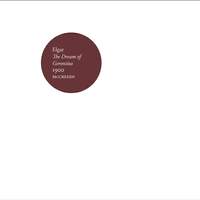Recording of the Week,
Paul McCreesh conducts Elgar's The Dream of Gerontius
As with all their recordings, McCreesh and his players have made enormous effort to research the types of instruments that would likely have been used at the Birmingham premiere, from Érard harps and a Lorée oboe previously owned by celebrated oboist Léon Goossens, to piston horns and narrow-bore trombones (including Elgar's own instrument).
The differences are striking and immediately apparent: from the opening moments of the prelude where violas are doubled by clarinets and bassoons, to a few bars later where the cor anglais takes over, the subtleties of Elgar's orchestration are realised to great effect. Similarly, the brass are capable of being loud without obliterating the rest of the orchestra; the way that the horns and trombones spit out their beastly contributions to the Demon Chorus is especially satisfying.
Most beguiling of all, however, is the timbre of the strings. The extensive use of gut strings allows for a haunting transparency of sound, which pays enormous dividends at the hushed start of Part Two. Elgar is quite particular with his dynamic markings, writing not only pianissimo (pp) and ppp, but also pppp and even "pp possibile"! Without wishing to denigrate the capabilities of modern instruments, the strings in McCreesh's orchestra offer a delicacy of tone that is spellbinding.
At the other end of the spectrum there's great power, notably the moment where the Soul of Gerontius is allowed a brief glimpse of God: the so-called "lightning" chord is perhaps the most powerful I have heard, aided hugely by the inclusion of the optional extra piccolo, trumpets and timpani that Elgar requests just for these few bars. There is a footnote in the score saying that on this chord "every instrument must exert its fullest force", and McCreesh certainly takes Elgar at his word here!
I should not forget that this is of course a choral work, and indeed the combined forces of Gabrieli, the Polish National Youth Choir, and the young members of the Gabrieli Roar scheme of which McCreesh is such an ardent advocate make up a formidable ensemble: sensitive in the quieter passages (with admirable clarity of diction at all times), and thrilling throughout the "Praise to the Holiest in the Height" section, in which the final monumental C major chord is sensational. The same could be said of the soloists: Anna Stéphany is wonderful as the Angel, ringing in tone in her multiple refrains of "Alleluia" and "Praise to His Name", and tender but noble in the closing "Softly and gently, dearly ransomed soul" (with what I would say is a perfectly-judged tempo from McCreesh).
Vocally, though, the star of the show is undoubtedly Nicky Spence, who from the very opening provides a performance that is magnificently nuanced in tone and deeply impressive in his delivery of text. To return to the infamous chord I referred to above, Spence's subsequent cries of "Take me away!" are extremely moving, and provide the icing on the cake of a highly illuminating recording. And if after all that I haven't yet managed to convince you, then keep an eye out on our website soon for my interview with Paul McCreesh where he talks most engagingly about his experience of making this recording.
Nicky Spence (Gerontius), Anna Stéphany (The Angel), Andrew Foster-Williams (The Priest/Angel of the Agony), Polish National Youth Choir, Gabrieli, Paul McCreesh
Available Formats: 2 CDs, MP3, FLAC, Hi-Res FLAC




